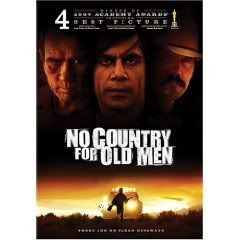REVIEWS
ACTRESSES
Movies free online
No Country for Old Men
In the stylish new Coen Brothers' movie, "No Country for Old Men," the violence is both graphic and coy, both in-your-face and strangely demur in the way it is portrayed. Bit players are frequently blown away in full view of the audience, while key characters often meet their ends off screen, away from the spotlight of the prying camera. For this is the theme of the movie, that violence is arbitrary, capricious and unpredictable, and that things are only going to get worse in a culture that has grown increasingly coarse and indifferent to human suffering over the years.
The "old man" of the title is Ed Tom Bell (Tommy Lee Jones), a small town Texas sheriff who, right on the verge of retirement, has seen a depressing spike in violent crime thanks to the recent proliferation of drug-running from Mexico (the movie takes place in 1980). For this is a "new time" in America, one in which an all-out criminal "war" is being fought, as much on the open plains as in the crowded cities. It is the "old men" like Bell, the last in a long line of old style Texas lawmen, who can no longer recognize their country and who are left to recede into the background bewildered and frustrated by their inability to do anything about it.
As the story opens, a group of men lie dead in a windswept field, victims of a drug deal gone terribly awry. The perpetrator is a psychopath by the name of Anton Chigurh (Javier Bardem) who is now wandering the countryside on a random killing spree, dispatching human victims as casually as the rest of us would a mosquito or fly. Llewellyn Moss (Josh Brolin) is a "retired" welder who stumbles upon not only the carnage-strewn scene but a suitcase filled with millions of dollars in unmarked bills. When Moss makes the fatal mistake of taking the loot, he becomes the prime target of Chigurh, who will stop at nothing to get what is rightfully his.
Based on the novel by Cormac McCarthy, "No Country For Old Men" is less notable for its story and characters than for its cinematic naturalism and impressionistic style. Despite having made some truly exceptional films in the past, Joel and Ethan Coen have never been as thoroughly in control of their medium or as supremely confident in their filmmaking as they are here. The first hour, in particular, is such a flawless masterpiece of composition and tone that it will probably be studied as a model in film school courses for years to come. Not since the films of Terrance Malick has landscape been used to more brilliant effect than in the opening section of this work. The setting - so brilliantly captured in Roger Deakins' incisive cinematography and Craig Berkey`s stunning sound design - becomes a palpable presence in its own right and a key player in the drama. The Coens have done their own editing on the film, which explains why the pacing feels like an exquisitely honed piece of music, built on finely calibrated beats and rests, meter and rhythm. The hypnotic, dreamlike quality of the filmmaking carries the story into the realm of archetype and myth which matches perfectly the surrealistic nature of the piece.
Bardem provides a bone-chilling portrait of a human killing-machine whose sole purpose in life is to destroy that which gets in his way (not that he doesn't enjoy killing just for the sheer pleasure of it as well). In Bardem's hands, Chigurh becomes the true incarnation of evil in its darkest form. Jones brings a world-weary gravity to the role of the sheriff, while Brolin, who gets the majority of the screen time in the film, does some of the best work of his career as the man desperate to keep one step ahead of his pursuer.
Perhaps predictably, the movie is not able to sustain the same level of greatness all the way through its running time and there are moments when the filmmakers seem to lose their way somewhat (particularly when Woody Harrelson shows up as a comic-relief bounty hunter). The unresolved ending may frustrate those who don't like any loose ends hanging around at the end of a story, but the inconclusiveness of the conclusion actually adds to the verisimilitude of the movie quite a bit.
Still, even if the movie falters a bit towards the end, there's no denying that "No Country For Old Men" is one of the outstanding films of recent times. In fact, that first hour or so is about as close to perfection as filmmaking is ever likely to get.
Posted by : Ela on
|
Labels:
best movies,
movies review,
No Country for Old Men
|
